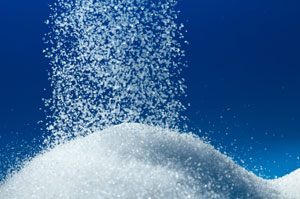Is Processed Sugar Addictive?
There has been a lot of discussion and debate over whether sugar is truly “addictive”. What has been proven is that the brain reacts to sugar in the same way that it does to some addictive drugs. It is true that the more sugar you eat, the more you will crave it. This is because the addictive properties of sugar can trigger a chemical and behavioral patterns common to chemical addictions (similar to traditional drug addiction). Removing sugar from your diet can do more for you than just reducing weight. Quitting sugar can help you to control the impulsive behaviors, blood sugar crashes and mood swings that come with the addiction and that produce withdrawal symptoms common with addiction.
What Happens to the Brain on Processed Sugar?
 Processed sugar, when processed by the brain, turns into a specific form of glucose – just as it does elsewhere in the body. The way the brain processes sugar and the form of glucose it turns into is slightly different. This is a fuel that feeds certain specific neurotransmitters in the brain that affect the receptors associated with pleasure and reward. These are the same receptors that are affected by endorphins that the body released upon exercise. The brain is complicated and not much is really known about the intricacies of its processing. One thing that is known is that the associative pattern capability of the brain should never be underestimated. It takes seconds for the brain to learn that sugar can deliver the same feeling of pleasure as a 5 mile run, but it can do so with less effort. Survival demands that the body maximize its efficiency so it determines that sugar is a better source of pleasure than something that requires so much effort. When you are in need of comfort or pleasure to medicate things like stress and emotions…your brain learns that sugar is a quick fix.
Processed sugar, when processed by the brain, turns into a specific form of glucose – just as it does elsewhere in the body. The way the brain processes sugar and the form of glucose it turns into is slightly different. This is a fuel that feeds certain specific neurotransmitters in the brain that affect the receptors associated with pleasure and reward. These are the same receptors that are affected by endorphins that the body released upon exercise. The brain is complicated and not much is really known about the intricacies of its processing. One thing that is known is that the associative pattern capability of the brain should never be underestimated. It takes seconds for the brain to learn that sugar can deliver the same feeling of pleasure as a 5 mile run, but it can do so with less effort. Survival demands that the body maximize its efficiency so it determines that sugar is a better source of pleasure than something that requires so much effort. When you are in need of comfort or pleasure to medicate things like stress and emotions…your brain learns that sugar is a quick fix.
How does it affect the brain?
When you put sugar into your body, the opioid and dopamine receptors in the brain are affected. These are the receptors that are most associated with pleasure and reward. It is the sudden influx of a stimulating substance to the receptors, and then its sudden removal (the sugar crash), that can then make the neurochemicals of the brain crave more sugar. It is a form of chemical interaction that results in a behavioral pattern. The brain learns the association that eating sugar increases feelings of pleasure and reward so it sends out signals craving sugar. This craving can then lead to addictive behaviors and binge consumption, all to avoid the very real neurochemical pain at the loss of pleasure. Craving sugar isn’t something that “is in your head,” it is a chemical drive to rebalance the brain that has been thrown out of balance by its introduction in the first place.
How to decrease your sugar intake
You can reduce and eliminate sugar from your diet easily. It will take you about 3 weeks of making an effort and paying close attention to your diet and then the adjustment is done. Here are a few ideas to help.
- Don’t drink sodas; even sugar free soda can be something that you may want to avoid. You will do better to break the habit of drinking sodas rather than create a new one of trying to find the sugar free soda you like.
- Avoid or reduce specialty coffees and drinks. These come with a lot of sugar already added in.
- Read nutrition labels and ingredient lists on all food and drink packaging. Sugar is often added as a preservative in many foods and drinks. You would be surprised at how much sugar you can find in frozen vegetables and entrees.
- Satisfy your sweet tooth with fresh fruit. Fruit has fructose, which is a natural sugar which is processed easily by the body, it also has fiber and other elements you need for good health, like vitamins. The sweetness of the fruit can be a great way to keep a dessert item on your list of choices.
- Remember that the less processed sugar you take in, the less you will also crave sugar. Your body will adjust quickly, its breaking the mental habit and desire for sugar that may take a week or two.
References
Avena, Nicole M.; Rada, Pedro and Hoebel, Bartley G. “Evidence for sugar addiction: behavioral and neurochemical effects of intermittent, excessive sugar intake”. Neuroscience & Biobehavioral Reviews, 2008;32(1):20-39. Epub 18 May, 2007.http://www.ncbi.nlm.nih.gov/pmc/articles/PMC2235907/
Rettner, Rachel. “Is Sugar a Drug? Addiction Explained.”. LiveScience October, 28, 2013. http://www.livescience.com/40749-addiction-drugs-sugar.html Accessed 2014-05-01.
World Health Organization, 3 March 2003,”WHO/FAO release independent Expert Report on diet and chronic disease”. Accessed 2014-05-01.



Comment Via Facebook